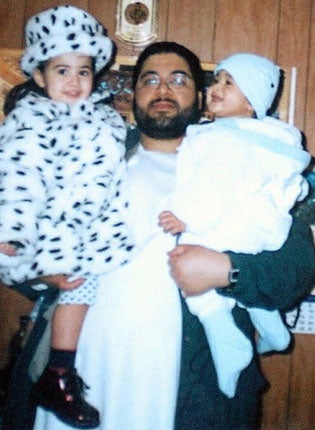Ministers' admission links MI5 and MI6 to 'torture victim'
Government says agents were sent to see British detainee held in Afghanistan

Ministers have admitted the Government sent secret agents to interview a British detainee in Afghanistan, supporting allegations MI5 and MI6 officers were present while he was tortured by his American captors.
The admission is made in documents addressed to lawyers representing Shaker Aamer, 42, who has spent seven years in Guantanamo Bay. His claims are part of a growing body of evidence highlighting Britain's alleged complicity in the rendition and torture of at least 15 other UK citizens and residents.
Mr Aamer, married to a British citizen with whom he has four children, says he went to Afghanistan in 2001 to work with local charities.
He says he was sharing a house with Moazzam Begg, the British man released from Guantanamo in 2005, when he was forced to flee the US-led invasion. But he was captured by an Afghan militant group, which passed him to the Northern Alliance, who in turn sold him to the Americans.
The CIA detained him in Afghanistanthen transferred to Guantanamo. In a letter from Foreign Office lawyers, the Government acknowledges that after Mr Aamer was held by the Northern Alliance, officers from MI5 and MI6 were sent to interview him. The letter concedes: "Whilst detained by US authorities the claimant [Mr Aamer] was interviewed by officers of the security and intelligence agencies on a number of occasions, both in Afghanistan and in Guantanamo."
Mr Aamer's continued detention at Guantanamo is the subject of a diplomatic dispute between Britain and the US. David Miliband formally asked Hillary Clinton, the Secretary of State, to release Mr Aamer into British custody. The Foreign Secretary's request was refused by the US Government which cited issues of "security". But his supporters say he has angered authorities in Guantanamo by providing support to other detainees protesting against their unlawful treatment and detention.
Yesterday Mr Miliband and the home secretary, Alan Johnson, continued to resist pressure over the torture of prisoners abroad, saying it was not possible to “eradicate” all risk of mistreatment. Meanwhile the Obama administration is close to appointing a criminal prosecutor to investigate allegations of abuse of prisoner abuse by the CIA at global detention centres.
Irène Nembhard, of solicitors Birnberg Peirce, who is representing Mr Aamer, has asked the Government to disclose the identity of US and UK agents involved in his interrogation, detention and torture.
In a legal claim against the Government lodged in the High Court, Mr Aamer's lawyers also allege MI5 and MI6 were complicit in his torture.
Mr Aamer says an MI5 or MI6 officer was present while he was being tortured by US agents at Bagram air base in Afghanistan in January 2002.
He said a man called "John", who said he was from British intelligence, was in the room when Mr Aamer's head was repeatedly "bounced" against a wall.
"John" was the same name given by Witness B, the MI5 agent who interrogated Binyam Mohamed.
In a statement to his lawyers Mr Aamer said: "After a few days of sleep deprivation, they took me to the interrogation room and the team started coming one after another, up to ten or more. One of them, a British agent, was standing, and they started talking to me in different languages –English, French, Arabic – and shouting.
"I started shouting with them, and after that I do not know what happened. All I know is I felt someone grab my head and start beating it into the back wall – so hard that my head was bouncing. And they were shouting that they would kill me or I would die. After this, they left the room and told me to think and tell them the truth or I would die."
In a claim before the High Court his lawyers allege: "UK intelligence services officers were present in the room whilst Mr Aamer was beaten. They provided information and encouragement to his US torturers. They made no attempt to stop his ill-treatment or any enquiries into his well-being."
A spokeswoman for the Foreign Office said the Government could not comment on Mr Aamer's allegations as his case is before the courts. But she added that Britain neither supports nor condones torture or inhumane or degrading treatment.
Britain on trial: Allegations of torture
*The most prominent allegations have been made by a British resident, Binyam Mohamed, who was arrested in Pakistan in 2002 for travelling on a false passport. He says he was hung for a week by a strap around his wrists. He says he was interrogated by the CIA, and visited by two British intelligence officers, one called "John".
*Jamil Rahman, a British civil servant, claims the UK was complicit in assault, unlawful arrest, false imprisonment and breaches of human rights legislation over his alleged ill-treatment while detained in Bangladesh. Mr Rahman, who has never been charged, says he was the victim of repeated beatings over more than two years by Bangladesh intelligence officers, and claims MI5 officers were involved.
*A number of former Guantanamo detainees have also filed writs against the UK Government. Eight are suing the Government saying it was complicit in their detention and interrogation at Guantanamo. They were detained in Afghanistan and Pakistan at various times. They include Omar Deghayes, Jamil el-Banna, and Bisher al-Rawi. Similar claims have been brought by Moazzam Begg, released in 2005, Richard Belmar, and the so-called "Tipton Three".
Join our commenting forum
Join thought-provoking conversations, follow other Independent readers and see their replies
0Comments